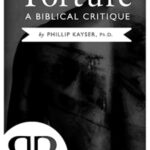
Five Priorities Tyrants Routinely Trample
Five Priorities Tyrants Routinely Trample
Written by
Gordan Runyan, from Immanuel Baptist Church in Tucumcari, NM brings a message about how the aim and objective of all kinds of tyrants routinely set themselves against what God says is a priority.

054: Should Christians Join and Serve in the Military?
054: Should Christians Join and Serve in the Military?
Written by
In episode #54 of the Out of the Question Podcast, Steve and Andrea interview Joseph Graham, a recently retired Navy pilot about his perspective and experiences as a Christian in the armed services.

Torture: A Biblical Critique
Written by Dr. Phillip Kayser
The United Nations, Solidarity International, and some human rights organizations have tried to define and rule out torture, but have been frustrated at how difficult it is to even define the term. Is abortion torture? Solidarity International surprisingly says “No.” But what is even more bizarre, that “human rights” organization has successfully brought a complaint before the United Nations against Nicaragua, claiming that this nation is engaging in torture against women on a massive scale by prohibiting all abortion! What is torture? Should our civil government ever engage in torture? How do we know? It is the contention of this author that apart from the infallible revelation of God in the Scriptures, no one can give a consistent answer. What are we to think of the practices of spanking, waterboarding, and corporal punishment? This booklet seeks to give a Biblically consistent answer to these and other questions.

Lectures on the Politics of God and the Politics of Man 05
Lectures on the Politics of God and the Politics of Man 05
Written by
Lectures on the Politics of God and the Politics of Man 05

Lectures on the Politics of God and the Politics of Man 04
Lectures on the Politics of God and the Politics of Man 04
Written by
Lectures on the Politics of God and the Politics of Man 04

The Curse of an Export-Oriented Economy
The Curse of an Export-Oriented Economy
Written by
Those who call for the US government to “stimulate the economy” by regulating import and export are calling for and economic disaster. They are calling for the government to turn us all into frugal tramps – and keep us so for the purposes of a government policy.
Assigned Reading:
– Idols for Destruction: The Conflict of Christian Faith and American Culture, Herbert Schlossberg

Lectures on the Politics of God and the Politics of Man 03
Lectures on the Politics of God and the Politics of Man 03
Written by
Lectures on the Politics of God and the Politics of Man 03

Lectures on the Politics of God and the Politics of Man 02 – Introduction Part 2
Lectures on the Politics of God and the Politics of Man 02 – Introduction Part 2
Written by
Lectures on the Politics of God and the Politics of Man 02 – Introduction Part 2

Lectures on the Politics of God and the Politics of Man 01 – Introduction Part 1
Lectures on the Politics of God and the Politics of Man 01 – Introduction Part 1
Written by
Lectures on the Politics of God and the Politics of Man 01 – Introduction Part 1

The Biblical View of “Class and Caste”
The Biblical View of “Class and Caste”
Written by
The central point here is that any communion or community has to be based on a moral commitment to a creed or a faith. It can’t be metaphysical, based on some neutral characteristics like genetics, place of birth, economic status, IQ, or anything else. It has to be ethical/judicial;…There has to be a transcendent faith, and that faith has to have a transcendent moral law which would unite all the members of the communion into one body, without losing each one’s identity. Without such selective communion with people of the same faith and the same moral status, any community will end up being a communion with evil.
Assigned Reading:
– The Protestant Ethic and the Spirit of Capitalism, Max Weber
